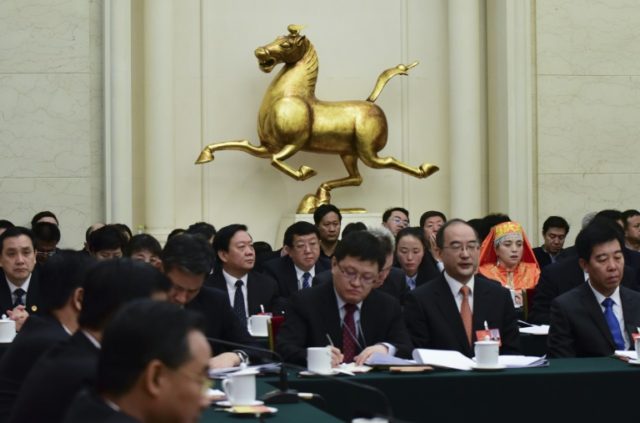Beijing (AFP) – China is set to pass its first constitutional amendments in 14 years this weekend, but at Wednesday’s public discussion on the changes, delegates seemed more interested in talking about beef noodles and taking naps.
No one expected dissent as legislators from the northwest provinces of Gansu and Qinghai gathered in Beijing’s cavernous Great Hall of the People Wednesday to deliberate changes to the nation’s most important legal document.
There is little suspense about the outcome of Sunday’s momentous vote to institute a number of major constitutional revisions including a decision to remove presidential term limits, opening a path for the current leader Xi Jinping to rule for life.
The 3,000 legislators of the National People’s Congress fill a mostly ceremonial role. The real decisions have already been made by the ruling Communist Party.
But even so, Wednesday’s two open sessions seemed remarkably free of substantive discussion about the consequential legal reform.
At the Qinghai meeting, delegates sat in a horseshoe as men in grey suits droned on about the work report delivered by Premier Li Keqiang to kick off the parliamentary session on Monday.
Ethnic minority representatives in the colourful robes of Tibet and Mongolia looked on. A couple of men wore the white skull caps typical of the region’s Hui Muslims.
They were nominally there to discuss the constitutional revisions, which include the rollout of a national anti-graft body, a larger role for the Communist Party and the addition of Xi’s eponymous political philosophy.
His “thought is extremely close to the public’s will, the public’s hearts, and is suitable for the totality of the undertakings of the Party and the nation”, said delegate Zhang Yongli, in comments that were echoed by everyone around him.
Half the session was spent reading out prepared speeches about issues such as environmental protection and clean energy. One delegate reached over and gently pinched a neighbour who had fallen asleep.
In the ochre marble room hosting the Gansu meeting, the “deliberations” were more about reading prepared remarks than debating the constitutional amendments.
“The changes are people-centred and full of warmth,” gushed Yang Hairong, president of a women’s association in her village and an ethnic Yugur dressed in a traditional conical white hat sprouting a tuft of red fringe.
Fan Peng, a member of Gansu’s local legislature, said he had listened to the advice of regular people, intellectuals and relatives after the constitutional amendment was proposed.
“Everyone I saw, without exception, completely supports the Communist Party proposal,” Fan said.
His words echo the party’s claim that “the masses” unanimously approve the amendment, even though many Chinese people have expressed their disapproval on social media, prompting censors to block their views.
When journalists were allowed to ask questions, Chinese reporters focused their queries on development, poverty, tourism and food, prompting a discussion about Gansu’s famous Lanzhou noodles.
None of the questions were about the constitutional amendments.

COMMENTS
Please let us know if you're having issues with commenting.